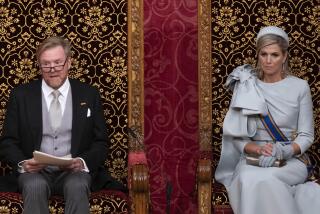De Klerk Sworn In, Pledges S. African Reforms
- Share via
PRETORIA, South Africa — Frederik W. de Klerk was sworn in Wednesday for a five-year term as president of South Africa and pledged to move swiftly to meet some demands of anti-apartheid leaders by releasing black political prisoners and trying to phase out or abolish the state of emergency that has cracked down on opposition to his white minority-led government.
De Klerk, a 53-year-old lawyer and scion of an old Afrikaner family, offered no timetable for his reform program. But he acknowledged growing pressure from inside and outside the country to quickly remove barriers to negotiations with blacks, and he called that effort “our highest priority.”
“We are determined to turn our words into action,” he told about 1,500 people, including foreign ambassadors and black and white schoolchildren, gathered beneath the midday sun on the steps of the Union Buildings, the hilltop Florentine-style palace that is the executive seat of government.
Four jet fighters buzzed overhead, trailing smoke in the blue, white and gold colors of South Africa’s flag, and an honor guard gave De Klerk and his wife, Marike, a 21-gun salute. Earlier De Klerk had taken the oath of office at a nearby church and, during the pastor’s sermon, a tear rolled down the chief executive’s face.
In his nationally broadcast inauguration speech, De Klerk indicated for the first time that his government is prepared to meet some of the conditions many black leaders have set for talking to Pretoria.
“We shall take certain initiatives (on) exactly those matters which so frequently are raised as obstacles by opponents of the government,” De Klerk said. “We shall do this because we believe civilized norms demand (it), because it is in South Africa’s best interest, and not because we buckle to pressure.”
May Ease State of Emergency
Some of the main stumbling blocks to starting talks have been demands that the government lift the three-year-old state of emergency and the ban on anti-apartheid groups and free jailed political leaders.
De Klerk pledged to try, by “strict maintenance of law and order, to make it possible to lift the state of emergency or, at least, to gradually move away from it.” In the past week, the government’s more relaxed approach to protest has resulted in a dozen large, peaceful marches, something not seen in this country in several years.
Many world leaders have pinned their hopes for change in South Africa on De Klerk. Before his party retained its majority in Parliament on Sept. 6, De Klerk vowed to end racial discrimination but to maintain laws that create racially separate schools and neighborhoods, thereby protecting white rights. He supports power sharing with blacks, but not black control.
“Radical organizations, who are only interested in the seizure of power, rule themselves out” of the peace process, he said.
De Klerk’s desire to be seen as a peacemaker and “a man for the future,” as the government’s literature describes him, was evident Wednesday.
Hours before his inauguration, De Klerk commuted the death sentences of seven inmates on Death Row, including a black man convicted of the 1986 “necklace” murder of a police constable in Tembisa township. In the years 1984-86, mobs killed dozens of police and suspected government informers by placing gasoline-soaked tires around their necks and setting fire to them.
De Klerk did not specifically mention Nelson R. Mandela, the 71-year-old jailed black nationalist leader, but he promised to continue releasing “security prisoners” so long as it promotes peaceful change and does not threaten public order. He did not repeat the government’s longstanding condition that Mandela renounce violence before he can be allowed to go free.
Senior government sources have told local newspapers that Mandela’s release, considered essential to bringing recognized black leaders to the negotiating table, is likely early next year. De Klerk has brought in one of his closest associates, Gerrit Viljoen, a former professor of classics, to lay the groundwork for negotiations with leaders of all races in South Africa.
Changes Expected
President Bush and other world leaders have said they expect De Klerk to produce significant changes soon, at least within a year, and have for the moment resisted pressure for additional sanctions against South Africa’s troubled economy to give the new president some breathing room.
“I am aware that we have raised certain expectations during the past months,” De Klerk said. “We intend to live up to them. . . . We fully appreciate the urgency of prompt progress.”
More to Read
Sign up for Essential California
The most important California stories and recommendations in your inbox every morning.
You may occasionally receive promotional content from the Los Angeles Times.














